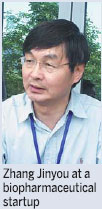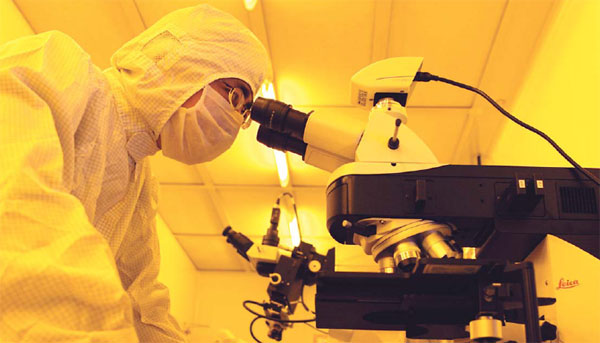Turning ideas into money
Innovation district matches creativity with commercial needs
Jiang Weiming says one of the major problems for those working in cutting-edge technology fields is how to turn their ideas into viable businesses.
This, he says, is the important challenge for Suzhou Dushu Lake Science and Education Innovation District, of which he is executive vice-chairman.
"The professors and academics which come up with brilliant ideas often do not know how to commercialize what they do," he said.
"It is about turning these ideas into businesses that are investible entities so they can become China's leading companies of the future, and this is where we can play a significant role."

Suzhou Dushu Lake Science and Education Innovation District, which was set up in 2002, occupies 25 sq kms of Suzhou Industrial Park's 278 sq kms.
Its main role is to foster the development of key emerging technologies, nanotechnology, biomedicine and cloud computing.
It is home to some 26 universities, including UCLA, Liverpool Jiaotong University and Skema Business School from France, which form a vital part of the district's knowledge-based ecosystem.
Jiang, 45, who was speaking from the head office restaurant, which with its modern interior would not look out of place in Silicon Valley, says the universities and research institutes based in the district play a key role.
"They have an agreement with the township to provide scientific research platforms to the companies based on the site."
The Suzhou Institute of Nano-Tech and Nano-Bionics, a Chinese Academy of Sciences institute, makes available its electronic microscope.
"It is a very expensive facility and companies can use it in the daytime and CAS only uses it in the evening. The township subsidizes the cost of companies using it."
The district consists of an 86-hectare technology and start-up campus, BioBay, which has modern restaurants as well as other leisure facilities, and the Suzhou International Science Park.
The latter is the home to GstarCAD, a computer-aided design software business started by two Tsinghua University computer science graduates, Lu Xiang and Huang Meiyu.
They moved the head office of the business, which was started in 2001 and now employs 300, from Beijing to Suzhou.
"We received a number of incentives such as a less expensive office building, tax concessions and also salary support for workers," says Lu, the 48-year-old president and CEO.
The company, which listed last year on the China's small companies board, National Equities Exchange and Quotations Company (NEEQ), produces its software for architects, engineers and also those in the mechanical and manufacturing sector.
Its products are around a fifth of the price of its main US rival.
"Designers used to sit down and face a screen but increasingly they want to work through mobile internet, on iPads and other smart devices. Engineers particularly like to take their designs to show workers on building sites," adds general manager Huang, also 48.
Lu insisted there are a lot of benefits for a software company to be based in the district.
"There is a pool of talented creative people in and around the district that we can draw on and it is a very attractive location for us to grow our business."
Jiang said the service center on the site, which has 12 staff, provides a wide range of support for small and medium sized businesses.
"Our task here is to provide companies with expert specialists. If they need a lawyer we have a list of lawyers and we can link them with a law firm and the same with a wide range of other services," he added.
Because technology is key to many of the businesses in the district they also have access to an IPR court set up on the Suzhou Industrial Park, which was the first of its kind to be set up in China in 2007.
"Defending their intellectual property is clearly a big issue for many of our companies," he said.
Around 20 companies have achieved listings both in China and also on international exchanges in New York and Australia.
Success stories include Tongcheng, China's largest travel website, which was a spin off out of Suzhou University in 2004. It now employs 3,000 staff, a number of which are in the district.
Innovent, a biomedical company, which is working in the area of cancer immunology, recently signed a 14 billion yuan ($2.14 billion) agreement with US pharmaceutical giant Eli Lilly to fund its research and development over 10 years.
Jiang says obtaining funding is very often not the problem for small and medium-sized businesses.
"It is often said that China's venture capital market is not as developed as that in Silicon Valley, but there is plenty of venture capital and private equity funding about. The challenge is converting great ideas into businesses and this is where we can help," he added.
Startup
A Chinese company that could be at the forefront of finding a cure for cancer is setting up a facility in BioBay, a state-of-the-art complex in Suzhou Dushu Lake Science and Education Innovation District.

BeiGene, which raised $167 million on NASDAQ in February, plans to manufacture its molecular- targeted drugs at the site.
Zhang Jinyou, head of bioprocess development and manufacturing at BeiGene, says it is one of the best locations in China for such a business.
"A big advantage is that there is a cluster of similar businesses, which hold meetings, seminars and conferences and generally support each other," he said.
"The biopharmaceutical industry is relatively new in China - only about five years old - and Suzhou is right at the center of the expertise."
Zhang, 58, who has a doctorate in biochemical engineering from MIT, has returned to China after 28 years to construct the GMP (good manufacturing practice) facility, which is vital for any drugs company.
"The companies here can share resources because we are all adjacent to each other. If you need some kind of support with testing or some equipment we can go to another company for help."
BeiGene, which is based in Beijing, has 215 employees worldwide, including a clinical headquarters in Fort Lee, New Jersey; Boston, Massachusetts; as well as other locations in Australia, New Zealand and Shanghai. Suzhou, however, will be its first manufacturing center.
Zhang says BioBay would not look out of place in Silicon Valley.
"It is just like California, although you do have winter here," he said laughing.
"You have so many universities here and biotech companies that it is easy to recruit knowledgeable and experienced people. You could not do this in Inner Mongolia or in Chengdu, where I am originally from."
He said local government support is also vital for companies such as BeiGene.
"They give you wholehearted backing and make available a wide range of resources. It is really everything you can think of that a start up company would need."
andrewmoody@chinadaily.com.cn
|
The Suzhou Institute of Nano-Tech and Nano-Bionics, a Chinese Academy of Sciences institute, makes available its electronic microscope to companies in the Dushu Lake innovative district. provided to China Daily |
(Shanghai Start 06/24/2016 page12)















